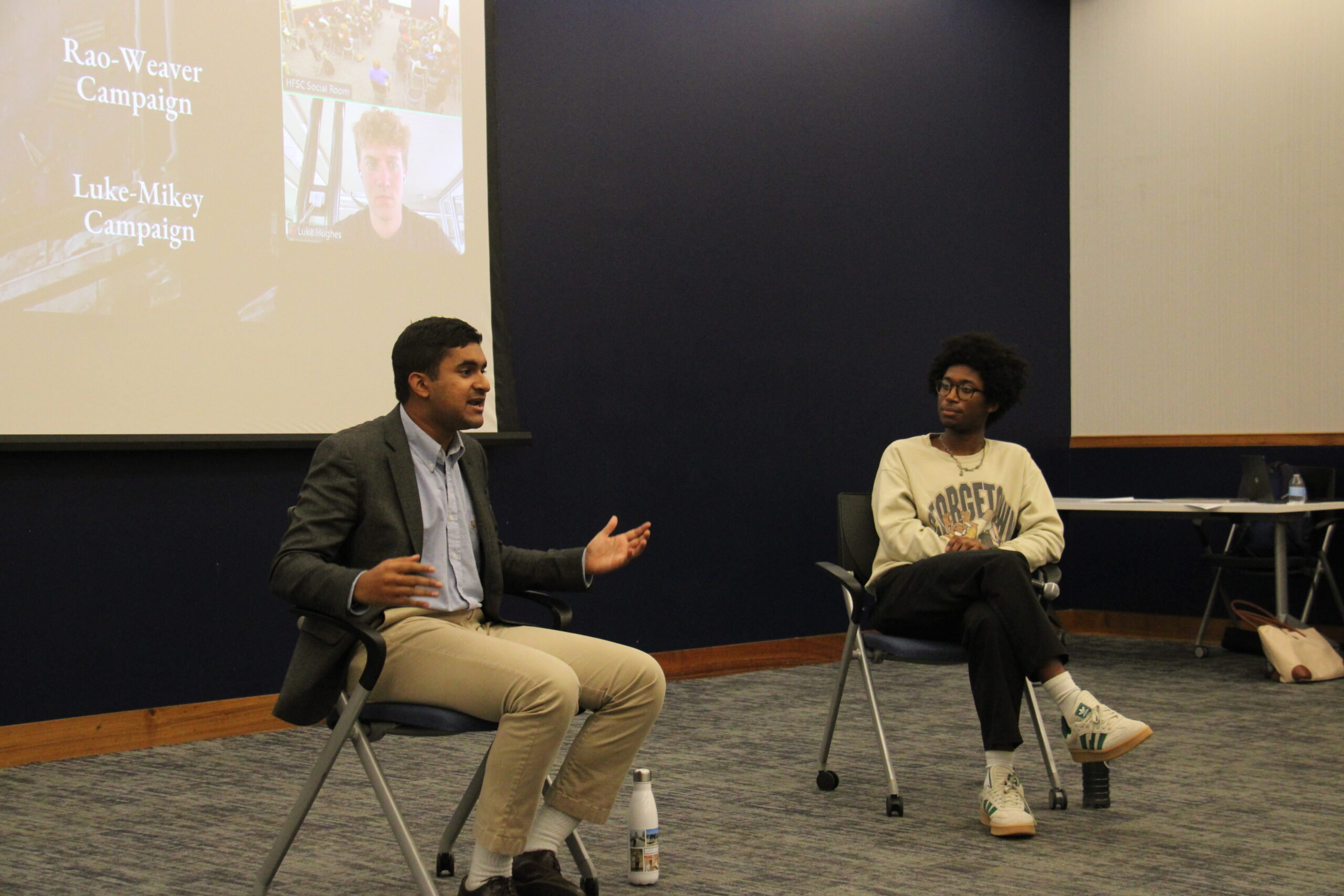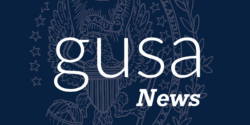The Georgetown Bipartisan Coalition moderated the annual GUSA Executive town hall on Oct. 15. It featured executive campaigns for Saahil Rao (SFS ’27) and Zadie Weaver (CAS ’28), Darius Wagner (CAS ’27) and Nazgol Missaghi (CAS ’28), and Luke Hughes (SFS ’27) and Mikey Williams (SFS ’28).
Moderators Connor Booth (CAS ’28) and Annabella Zhang (SFS ’28) asked the presidential candidates questions pertaining to student life, university administration, and issues beyond Georgetown such as national politics. Vice presidential candidates answered audience questions.
Student Life
In regards to student life, Zhang asked presidential candidate Rao about the steps he planned to take to “save Vil A,” and why preserving fun has been a central theme of his campaign. Rao said his campaign is focused on addressing issues that matter to students.
“What we’ve seen this year is a complete crackdown on our ability to party,” Rao said. “SNAPs [Student Neighborhood Assistance Program] shuts you down before you start. RAs shut you down 10 minutes in without any unofficial warnings anymore. This has to change, and it has to be prioritized.”
Rao also said he aimed to make interclub collaborations easier by making it easier to book university spaces on Georgetown Event Management Services and creating an open-access email that collects and sends out club events to the student body.
Zhang asked Rao how he planned to accomplish his campaign’s various initiatives. Rao said that his administration would create departments, such as an academic department, to address specific issues.
Moving to presidential candidate Hughes, Zhang asked how his administration would achieve their goal of “rightsizing” GUSA to address student needs.
Hughes said that his administration would make GUSA more effective and efficient by reducing the number of people in the organization. He also said that he would prioritize funding student clubs and facilitating student-administration relationships.
“[Rightsizing] could look like a reform on the Senate in particular. It could look like a removing on the Policy and Advocacy committee [PAC],” Hughes said.
Hughes also said his campaign calls for Georgetown to allow students with access to kitchens who are paying full tuition to switch to a reduced meal plan to fit their dietary needs.
An audience member asked Hughes how he intended to get rid of PAC, saying the GUSA president has no jurisdiction over a senate committee. Hughes responded that he thinks some GUSA efforts currently serve a similar role to other campus organizations and that he intended to shift responsibilities within GUSA.
Zhang asked presidential candidate Wagner why his platform “Let Hoyas Be Hoyas,” which aims to reduce weekend quiet hours and address the residential citation system, is important.
Wagner said shortening quiet hours can reduce the number of citations students face, and that his administration would work with the Office of Student Conduct to change the citation policy.
“We need students to have an avenue to have something outside of their academic spaces, to be able to utilize the spaces and not have fear of cracking down,” Wagner said.
Zhang also asked Wagner to elaborate on his proposal for a GUSA “Fundraiser Fund” that would give student organizations “strings-free seed funding.” Wagner said his administration would work with the Center for Student Engagement (CSE) to crowdsource funding from academic and administrative departments.
Wagner also said that his administration aims to introduce more fun experiences on campus. He said the hammocks, swings, and gaming tables that the Henshaw-Wagner administration introduced show his ability to deliver.
An audience member asked Wagner to clarify why he was seen exiting a vehicle of a known alumnus. This comment seemingly referenced student forum concerns on candidates’ associations with secret societies. During his Q-and-A portion, Wagner addressed the earlier question, saying that the statement was untrue and he had been exiting an Uber XL. Rao had confirmed his membership in the Second Stewards Society on Oct. 15.
An audience member and member of Georgetown Resident Assistant Coalition (GRAC) asked Wagner how his citation policy would affect RAs. Wagner said he aimed to prevent Residential Education’s potential retaliation against RAs for unionizing.
“I’m particularly concerned that Res Ed [Residential Education] is cracking down on the RAs, because they’ve decided to unionize,” Wagner said. “We’re going to work hard to continue supporting the RA union and prevent this retaliation that we’re seeing.”
University Administration
Zhang asked Hughes about his existing relationship with university administration. Hughes said he has had multiple experiences with Georgetown administration, including a Georgetown vice president he interacted with on a trip to Hong Kong and Beijing for the U.S.-China Dialogue on Global Issues initiative.
When asked whether he would support student referendums, Hughes said he would welcome them to voice student concerns, although his administration does not have any specific referendum ideas in mind.
Hughes also said that his four-page campaign platform is a concise plan and that he and vice presidential candidate Williams plan to be a transparent and open GUSA executive team.
Zhang asked Wagner how he plans on expanding student access to university administrators. Wagner said that he and the 2024-2025 GUSA Executive board have built existing relationships with university administration and that he would continue building on these connections.
Wagner added that his platform’s support of ending legacy admissions and renegotiating a divestment referendum is reflective of Georgetown’s mission.
“The reason I support these proposals is because it’s grounded in my belief in our Jesuit values,” Wagner said. “We also have a new president oncoming. So there presents new opportunities to push this advocacy that isn’t possible under [interim President] Groves.”
Wagner said he aims to provide more student input in the university’s fundraising campaigns, including collaborating with the Office of Admissions to center campaigns on student financial aid and expanding funding for clubs.
When asked about his relationship with university administration, Rao said that as the current Speaker and Vice-Speaker of the GUSA Senate, he and Weaver meet with administration regularly. Rao also said that he hopes to allow alumni to directly fund Georgetown Programming Board (GPB) events to free up funding from the Student Activities Fee for other organizations.
When asked for clarification on his platform regarding Georgetown Scholars Program (GSP) initiatives, Rao said that his platform intends to increase awareness about GSP grants and guarantee GSP standard fee waivers for events.
Beyond the Hilltop
Booth asked Wagner how his platform intends to “push the new president to not succumb to federal intimidation,” referring to Georgetown’s incoming president Eduardo M. Peñalver. Wagner said he aims to ensure student voices are heard.
“I have plenty of experience with admin. I’ve already been talking to them about a range of issues, around National Guard, around crackdowns, around the threats to our undocumented immigrant and international students,” Wagner said.
When asked about his initiative to address student transportation like increasing Georgetown University Transportation Shuttle (GUTS) bus services on weekends and to the Capitol Campus, Wagner said he thinks students should be able to explore downtown more easily and that Capitol Campus students have ensured access to Main Campus.
Booth asked Rao about his initiative to create an “informed student newsletter” to update students on the university’s decisions. Rao said that the newsletter would not be used to express GUSA positions on federal actions but inform the student body on the Georgetown administration’s decisions.
“What this came out of was really the lack of clarity that we’ve had from the administration on what’s going on with the Trump administration and how they’ve been responding to it,” Rao said. “We deserve to know when admin is making decisions about our university.”
Rao also said that he believes GUSA should focus on the Georgetown student body instead of “external issues.” He said that he had voted no on the divestment referendum last spring to stand up for academic freedom and considerations of the university’s fiscal environment.
“The referendum called for us to cut our ties with [Tel Aviv University]. I don’t think that’s exactly right,” Rao said. “It’s important to defend academic freedom on the actual contents of the referendum.”
Booth asked Hughes how he intended to increase collaboration between Georgetown and other D.C. universities in response to the Trump administration’s actions. Hughes said that GUSA should coordinate with Georgetown administration and other D.C. universities to specifically address the Trump administration’s threats on international student visas, federal grants, and financial aid.
“However, right now, we think that GUSA should be careful to not become a political mouthpiece,” Hughes said. “We think that there’s many organizations on campus that already participate in political advocacy, where students can go to those clubs that they wish to actively find.”
Booth asked Hughes how his administration would interact with national politics that do not center on Georgetown. Hughes said while he would encourage protests on Red Square and for students to speak out in accordance with the university’s free speech policy, it is not GUSA’s role to participate in the protests.
An audience member asked Hughes what he would consider “crossing the line” when it comes to student protests.
“When someone hides their face, when they’re not identifying themselves as a student, the university doesn’t know if they’re a member of the community,” Hughes said. “That’s where I think the university does have a right to push back against these protests to ensure that there’s still security on our campus.”
Hughes also clarified that he does not think there should be a larger police presence on campus, but that GUPD should be stationed at club events of all sizes to make students feel safer.
Vice President Questions
The moderators invited audience members to ask each vice presidential candidate questions. One audience member asked how each administration plans to execute its club funding allocations.
Williams said that he believed GUSA executive funding should be cut. He also said that GUSA should focus on helping clubs with on-campus events because off-campus events require a lot of funding.
Weaver said that she and Rao had previously served as liaisons for the Finance and Appropriations Committee (FinApp), the senate committee that allocates club funds. She said her and Rao’s campaign would create a fund for GPB and that she planned to lower funding for the GUSA executive which would be allocated to clubs.
When asked how she would prioritize the campaign’s Vil A initiatives, Weaver said that she and Rao already met with Residential Living and hope to bring student voices into the conversation around rebuilding Vil A.
In response to the same question, Missaghi said that an integral part of her and Wagner’s campaign is to defend their values both on and off campus, particularly to protect affinity spaces.
Missaghi also addressed questions about how she would navigate the GUSA vice presidency without any GUSA experience. She said being new to GUSA gives her a unique perspective and that she has the skills from leading other large groups to be vice president.
Voting for GUSA Executive will take place between Oct. 22 to Oct. 24. Students will also have the opportunity to vote for senators serving the class of 2029 and four at-large seats. GUSA has yet to announce any referendums that will be voted on concurrently.
Evan Schleck contributed reporting.




